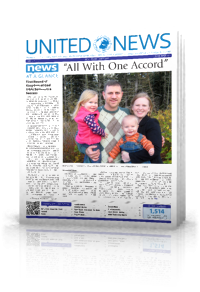What I Learned From Being Unable to Attend the Feast

Throughout the summer this year, Diane and I were eagerly looking forward to going to India and Sri Lanka for the Feast.
On September 1st I went into a local hospital for routine foot surgery. I was told I would be back on my feet in a week or two. That left me with plenty of time to recuperate before the Feast.
I was also told that in one percent of cases there is a risk of infection. I turned out to be that one percent!
The rare bacterial infection I got required hospitalization. At the same time, the wound in my foot would not heal. It soon became clear that we were not going anywhere. Even now, two weeks after the Feast, I still cannot go far out of town. I have to go to the hospital three times a week to have the dressing on my foot changed.
At first we were rather discouraged at having to stay behind. There were a few others in the area, and we planned on getting together. But then I struggled with nausea as a result of the infusions of antibiotics, and I was not up to going anywhere.
Empathy
We now know what it’s like to miss the Feast of Tabernacles. As a result of that, we have much greater empathy for those who, usually for reasons of health, cannot go.
The apostle Paul wrote in 2 Corinthians 1:3-4, “Blessed be the God and Father of our Lord Jesus Christ, the Father of mercies and God of all comfort, who comforts us in all our tribulation, that we may be able to comfort those who are in any trouble, with the comfort with which we ourselves are comforted by God.”
Not only do we feel a great void in our lives at having missed the Feast, we also feel a renewed commitment, determined to be present in every future year, fellowshiping with God’s people “so much the more as [we] see the Day approaching” (Hebrews 10:25).
Encouragement
What was very encouraging during the Feast was knowing that people were praying for us and, in particular, for my health situation. The nausea I was feeling lifted at the end of the Eighth Day, which I attribute to the prayers of God’s people. Throughout the Feast, we received many cards and phone calls, flowers, baskets of fruit and other food and even two bottles of moonshine from Gatlinburg (still unopened)! So though we were absent in the flesh, we certainly felt present in the Spirit!
When people called from different Feast sites, including international sites, one thing that kept on bringing joy to our ears were their reports of the peace and unity they felt at the Feast. I was reminded of Psalm 133:1: “Behold, how good and how pleasant it is for brethren to dwell together in unity!”
Hope
Only a few months ago, dissident rumors were spread claiming that the United Church of God was going to do away with the Sabbath and the Holy Days—entering mainstream Christianity. Brethren, as you know, there was never any such plan. Not one of the people spreading these false allegations had the common sense to call me or any other member of the Council or administration to see if there was any element of truth to them.
I came out of the Methodist Church well over 40 years ago into the Church of God.
It wasn’t easy giving up some of the traditional days that the Methodist Church kept, especially as doing so complicated family relationships. But it was worth it to know the plan of God, which mainstream Christianity does not understand. God’s plan gives us something the rest of the world doesn’t have—peace of mind. We know what it’s all about. We know what it’s all leading to. We know that, in spite of all the problems reported constantly on our news channels that daily darken our existence, there is light at the end of the tunnel—the glorious return of Jesus Christ and the establishment of the Kingdom of God.
The apostle Paul described our feelings and emotions so well in Romans 8: “For we know that the whole creation groans and labors with birth pangs together until now. Not only that, but we also who have the firstfruits of the Spirit, even we ourselves groan within ourselves, eagerly waiting for the adoption, the redemption of our body” (verses 22-23). This is what we live for. This is what we have dedicated our lives to. This is why we faithfully attend the Feast of Tabernacles each year and observe the other Holy Days in our home churches.
We are reminded of God’s plan every Sabbath and every Holy Day. In fact, the Kingdom of God should be at the forefront of our minds and in our thoughts at all times. Jesus Christ taught us to pray daily, for our physical needs (“our daily bread”) and for the Kingdom of God (Matt 6:10-11). “Your will be done.” Until His will is done, this world will know no peace and people will continue to flounder, not knowing how to solve their problems. We are to “seek first the kingdom of God and His righteousness” (Matt 6:33).
Having missed this year’s Feast, Diane and I are already planning for next year. We look forward to seeing some of you then.


